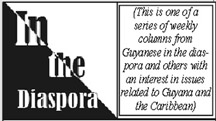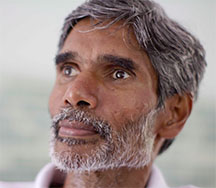Editor’s Note: Nineteen days ago, on September 17th, Dr. Wayne Kublalsingh began a second hunger strike – no food, no water – in Trinidad and Tobago. Dr. Kublalsingh is a leading member of the Highway Reroute Movement, which has been seeking to engage the Government of Trinidad and Tobago over a portion of the highway between Debe to Mondesir in its Point Fortin highway project. Two years ago, Kublalsingh embarked on his first hunger strike, which ended when the government agreed to the establishment of a Highway Review Committee. The government’s decision to proceed with the planned construction of the Debe to Mondesir segment, notwithstanding the Committee’s report that further studies first be carried out, is what has precipitated Kublalsingh to put his body on the line again. In Saturday’s Trinidad Guardian, his doctor of Guyanese parentage, Asante Van West-Charles-Le Blanc, attending to him outside the Office of the Prime Minister where he has taken his quiet protest, noted that “he is alert oriented, there is no mental deficit at this time, but his body is slowly deteriorating, physiologically speaking from all that we have done, the testing and my physical examination which I have been monitoring on a daily basis.”

Getting involved has meant becoming informed, moving beyond vindictive and ad hominem attacks (like the dismissal of the Women of Highway Reroute as ‘bags of aloo’ by a government minister who was himself most sympathetic to the movement when he was in opposition). As columnist and university lecturer Gabrielle Hosein said in the Trinidad Guardian last week, “I came to understand that there were billion dollar non-tendered contracts at stake, unnecessary destruction of parts of the Oropouche Lagoon, massive avoidable quarrying of the Northern Range, and demolition of long-established religious and familial communities.” This week, we carry the statement by the Movement for Social Justice, which clearly lays out the issues. This is bigger than a portion of a highway. In a statement to the Guardian, Dr. Kublalsingh urges us to see that there is so much more at stake: “There is a need to develop a new economic philosophy to govern the way we live and the choices we make. I have a larger mission so I can’t give it up now that is why I cannot relent and I have to be alive at the end of the day to fight for a larger mission.”

The Movement for Social Justice (MSJ) expresses its solidarity with the Highway Re-Route Movement (HRM) and its leader, Dr. Wayne Kublalsingh as they continue their struggle for justice. As we have repeatedly stated, the Government continues to deliberately mis-inform the country about this issue. Firstly, there is not one highway being constructed. There are two highways – the San Fernando to Point Fortin Highway and the Debe to Mon Desir Highway.
There has never been any dispute with respect to the San Fernando to Point Highway. The Highway Re-Route Movement itself has supported this Highway. The MSJ supports the San Fernando to Point Highway. Citizens, particularly those from the deep south – La Brea, Point Fortin, Cedros – must not get caught by the government’s mis-information: nobody is seeking to stop the construction of the San Fernando to Point Fortin Highway.
What is in dispute is the separate Debe to Mon Desir Highway. This Highway is what the HRM has been battling for years. Indeed, their struggle started before 2010 and was initially against the actions of the then PNM Government and persons who are now in the UNC Government like Dr. Roodal Moonilal were leading the HRM. For those politicians, however, there is neither principle nor policy, only what is expedient.
It took Dr. Kublalsingh’s courageous hunger strike in 2012 to force the government to agree with major civil society organisations to establish an Independent Review Committee comprised of a team of multi-disciplinary experts to examine all the facts surrounding the Highway. That Committee, chaired by Dr. James Armstrong, produced a significant Report, the first time that an Independent Committee had reviewed a major Government project. The Committee found that crucial studies that would have been necessary before embarking on the Highway project had not been done and recommended that work on the Debe to Mon Desir Highway be halted until the studies had been done.
The studies have not been done, yet the Government is proceeding apace with the construction of the Debe to Mon Desir Highway. The Government claims it is not obligated to abide by the Armstrong Report’s findings. So why agree to set up the Committee in the first place? To mamaguy citizens? As a way to end the first hunger strike by Dr. Kublalsingh? By refusing to abide by the Armstrong Committee’s Report; by refusing to halt the work on the Debe to Mon Desir Highway until the relevant studies are undertaken as recommended by the Committee, the UNC Government is saying to the country that there is no justice in Trinidad and Tobago.
Citizens in the south – like those in Siparia, Penal, Fyzabad – who also need to be relieved of traffic jams have genuine concerns and these have not been ignored by the HRM which has proposed alternative routes and upgraded road networks to address the traffic congestion. These alternatives would be properly studied if the Armstrong Report is implemented and at the end of the studies the best options arrived at. The HRM itself has stated that if the best option – evaluated on the basis of the socio-economic and environmental impact assessments – is the Debe to Mon Desir Highway, they will accept it. The Government’s refusal to adopt a similar position says that they are not interested in justice and intend to govern using the might and power of the state.
Justice and the law are not necessarily one and the same. The HRM has filed legal action in order to get justice. The Government has been using every legal tactic available to it to delay the final determination of the case. In the meantime it is proceeding apace with construction of the Debe to Mon Desir highway. The delays included objecting to the Judge hearing the matter; appealing the Judge’s decision not to step down from hearing the case and so on.
The Prime Minister issues a statement in which she seeks to mis-inform the public. She states that since the matter is before the Court there can be no other outcome but to wait for the Court to decide. This is false. Everyone knows that two parties in dispute can settle a matter outside the Court and then have the Court informed of their mutual agreement. In fact the Court supports this since it saves judicial time and it understands that an outcome in which two parties agree among themselves is far more acceptable to both than a judgment imposed by the Court.
In addition, when the Prime Minister suggests that the HRM should take no action until the Court decides, she is pushing double standards: one for the residents and the HRM and the other for the Government. A level and fair playing field is one where both parties agree to take no action and wait on the Court to decide. That is, while the process is going through the Courts, the Government should halt all work on the Debe to Mon Desir Highway. By refusing to meet with Dr. Kublalsingh; by refusing to halt work on the Debe to Mon Desir Highway while the matter is before the Court is in our view an act of contempt by the UNC Government– maybe not contempt of Court; but contempt for Justice. And that is why we say that law and Justice are not necessarily the same.
The MSJ is deeply concerned about this injustice. It has placed the HRM in a no win situation. Even if they were to eventually win their case in the Courts by that time the residents would have lost their land and their communities would have been destroyed. When citizens are faced with such injustice what options are open to them to obtain justice? If one can’t get justice through the legal system what are citizens to do? Dr. Kublalsingh took the action of a hunger strike in 2012 – this resulted in the Review by the Independent Committee. One had expected that justice would now result, but is hasn’t because the Government has reneged on its commitment to abide by the recommendations of the Armstrong Committee. Faced with this lack of justice, Dr. Kublalsingh has decided to embark on another hunger strike. Who can condemn him for that? What other option does he have, if all other mechanisms have been effectively frustrated by the UNC government intent on proceeding with a project that is 200 times more expensive and potentially hundreds of times more environmentally dangerous than the Las Alturas buildings that were built on shifting land?
The MSJ reminds that “where there is no justice there will be no peace”. We call on the UNC Government and Prime Minister Persad-Bissessar to immediately halt work on the Debe to Mon Desir Highway, implement the Armstrong Committee’s Report and await the Court’s final decision.




